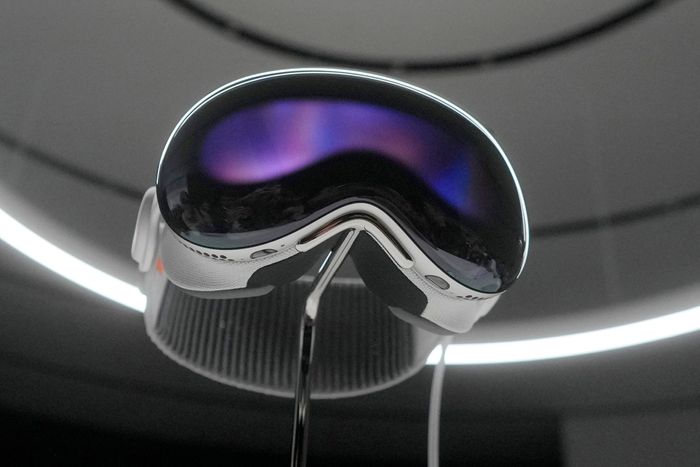Meta Platforms is hoping Apple's launch of the Vision Pro can reinvigorate its $50 billion metaverse effort, which consumers have yet to widely embrace.
The social-media company wagered its reputation on the technology in 2021, changing its name to reflect an expansive vision that the future would rest in immersive virtual worlds.
Three years later, Meta's Reality Labs division accounts for less than 1% of overall revenue, and the company has struggled to expand the cache of its Quest devices beyond a niche market. Reality Labs is expected to lose $115 billion between now and 2030, according to FBB Capital Partners.
On the eve of the arrival of Apple's Vision Pro, which will hit U.S. stores Friday, executives at Meta are optimistic, believing the iPhone maker's entry into the market will validate Chief Executive Mark Zuckerberg's gamble and draw more consumers, according to people familiar with their thinking.
Meta employees see the Quest and its software ecosystem emerging as a primary alternative to Apple in the space, filling the role played by Google's Android in smartphones, the people said.
Apple's encroachment into the headset space marks the latest chapter in a bitter rivalry with Meta. The two have clashed on several fronts in years past, ranging from consumer privacy on the iPhone to, more recently, the distribution of apps in Europe.
The battle that Meta executives and industry insiders see coming centers on software makers who will play an outsize role in developing applications that will draw more users.
"Meta is going to have to step up their game and make sure that whatever they're making still attracts that core developer," said Kim Forrest, chief investment officer at Bokeh Capital Partners. "This could be the Apple Newton -- if you remember that, that was a real flop -- or it could be the next iPhone."
The Newton was a hand-held personal digital assistant released in 1993 that is recognized as one of Apple's biggest failures for its steep price tag and numerous glitches.
Apple's coming headset -- whether it succeeds or not -- has influenced Meta's thinking, the people said. Meta is increasingly focusing on mixed reality, which allows users to see virtual images overlaid on their real-world surroundings. Previously, Meta talked more about the metaverse, an amorphous concept that imagined people working and playing in virtual reality.
In addition, some developers are simplifying their apps and favor Apple's design that allows wearers to use their eyes and fingers to control or manipulate what they see. Meta's Quest primarily relies on the use of controllers for games or applications, although it can work with finger gestures.

Meta first got into headset devices when it acquired Oculus VR for $2 billion in 2014. Including the acquisition, Meta has spent at least $50 billion on its Reality Labs hardware division, according to the company's financial filings. Meta's Quest headset counted 6.37 million monthly active players as of October 2022, according to documents viewed by The Wall Street Journal.
Meta released the latest version of its headset, Quest 3, in October and shipped 2 million to 2.7 million devices in the fourth quarter, according to an estimate by IDC. That figure is a significant uptick from the 160,000 Quest 2 units Meta shipped in the fourth quarter of 2022.
At $500, the Quest 3 is significantly more affordable than the Vision Pro, which Apple priced at $3,500.
For years, Zuckerberg and Chief Technology Officer Andrew "Boz" Bosworth and others have said that having at least one strong competitor could offer a huge boost to the market, the people said.

Cathy Craig, CEO of Incisiv, a VR game developer, said she was told by a Meta employee at a recent event that Apple's entry into the market was great because more people will want to try headset devices.
"What Meta thinks is people will buy their headset because it's cheaper, " she said.
Though the Vision Pro's price point might be restrictive to consumers, Apple's technology is welcoming of developers.
The Apple device uses infrastructure akin to that of the iPhone and iPad, which makes it easier for any software developers with experience building apps for Apple devices to get into developing apps for the Vision Pro. With such an accessible on-ramp and an existing, broad pool of iPhone and iPad developers, Apple might be able to easily lure software developers onto its headset and possibly away from Meta's.
Aside from price, Apple's approach to headset technology differs from Meta's.
Meta's Quest Store is primarily made up of videogame, fitness and virtual social apps. Apple is promoting the Vision Pro with tasks and apps that consumers are already used to, such as browsing the web, watching sports and movies, or FaceTiming with loved ones.
Meta has spent the majority of its decade in headset-making with a focus on virtual reality, meaning users are blinded from the real world and primarily see an entirely computer-generated environment when they put on a Quest device. Apple's Vision Pro is launching with augmented reality as its focus. Users of the Apple device see virtual shapes, such as app icons and video screens, overlaid on top of what surrounds them in real life.
Meta reoriented its hardware plans to shift its Quest devices away from being entirely focused on virtual reality and incorporating more so-called pass-through abilities, which give users clear images of their surroundings, the people said.
This shift was first apparent to the public when Meta launched the Quest Pro in October 2022 and again last fall with the launch of the Quest 3. Both headsets have superior pass-through features compared with previous Quest devices, and Meta has incorporated the feature into its marketing. The company has primarily promoted the Quest 3 as a "mixed reality" device that allows users to "transform your home."
Some software developers are designing their headset apps to reduce their reliance on controllers.
Apple has designed its headset so users can control the device by looking at items with their eyes and making a pinching gesture with their fingertips. Meta's Quest devices are primarily directed using controllers with joysticks, buttons and triggers such as those of videogame consoles.
Sondre Kvam, CEO of headset productivity app Naer, said he and his co-founder are trying to use as few of the buttons as necessary in their software. Doing so will make it easier to create a similar experience if they eventually decide to bring the app to the Vision Pro or other headsets.
Kvam said humans have evolved to get tasks done with as little energy as possible, and they don't like having to memorize buttons, which makes Apple's pinch gesture a good solution for headset devices.
"We were already moving in that direction, but obviously it was a great confirmation," he said.
Not all developers are convinced.
Craig's company makes CleanSheet, a VR game that helps people train as soccer goalkeepers. She says she likes that the Quest's controllers provide a high level of motion accuracy for her users.
"When you have no controllers or sensors on the limbs at the moment with the system, it's probably not good enough," said Craig, adding that she is eager to buy a Vision Pro and start testing it out.


